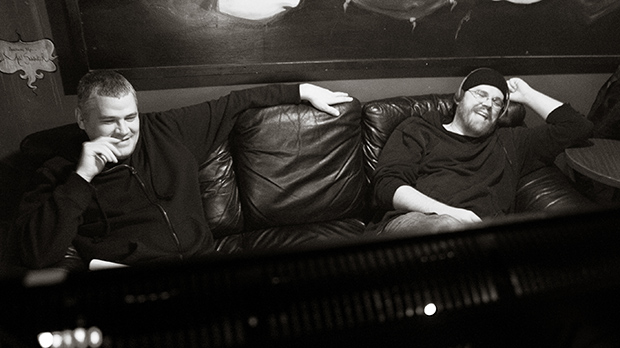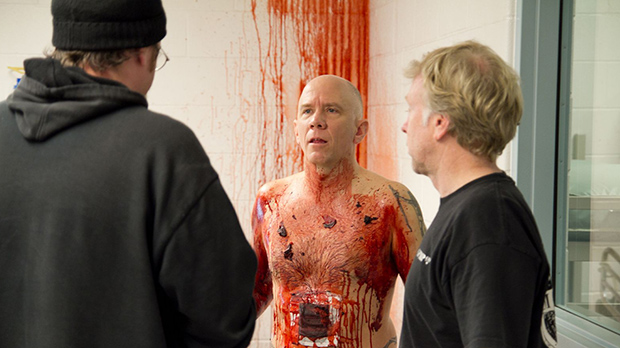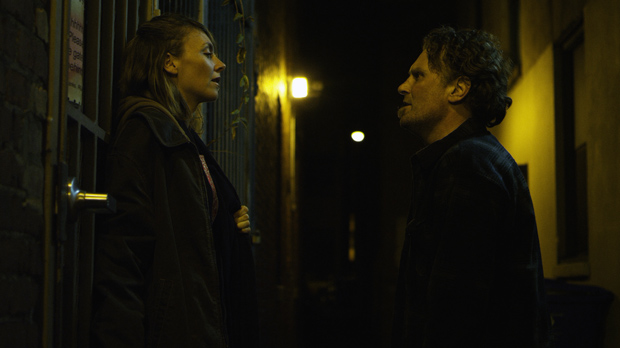 Back to selection
Back to selection
The Freeman Brothers on Cell Count, The Weather Outside and Indie Genre Filmmaking
 Jason and Todd Freeman. Photo by Levy Moroshan.
Jason and Todd Freeman. Photo by Levy Moroshan. Brothers Todd and Jason Freeman are a filmmaker duo who have been working together for more than 15 years. They collaborate closely during the creative process yet each writes and directs their own films. I caught them fresh off of completing two microbudget movies back-to-back. Jason’s feature, The Weather Outside, is a kind of noir drama which takes place over the Christmas holidays. Todd’s film, Cell Count, is a body horror flick about the side-effects of an experimental drug treatment.
Filmmaker: How do you work as both brothers and a filmmaking team?
Jason: Well, it starts early on. One of the things that’s unique to us is that we have very separate ideas, so we always start by pitching our ideas to each other. We help each other get over that first creative hurdle of writing the screenplay and we’re sort of the first critic, which is nice, because we have similarities but we’re also very different.
Filmmaker: Can you elaborate on the similarities?
Jason: Well, we grew up watching a lot of the same films, but we also grew up not watching a lot of the same films. I guess that would go back to our dad, in being at different points at his life, [Todd and myself] having a six-year age separation. I watched film noir with my dad, silent films, he had a vast 16mm collection — this was when Todd was younger and wasn’t interested in these movies. So the differences would come on when my dad grew older. My dad still wanted to take me to see the films of Orson Welles, Marx Brothers, film noir, Plan 9 From Outer Space. My dad was taking my brother to see a different kind of film.
Todd: That was [Jason] was already in college. He would take me to go see Segal…
Jason: Jean Claude Van Damme movies!
Todd: [Laughs] Those types of movies, you know: bad, over the top…
Jason: This is all going to start making perfect sense.
Filmmaker: Was this like an evolution of his own taste?
Jason: No I think maybe he sensed that I wasn’t interested in those types of films, and that he had a compadre in Todd.
Todd: That being said, in my early twenties I went back and saw all the movies that Jason was taken to the theater to see…Woody Allen…you know.
Filmmaker: How do you split the work between the two of you?
Jason: Once the screenplay is done, the only time we really, truly collaborate on a set is when it comes to the cinematography, to the visuals, because that’s where we’re most similar.
Todd: We think the same when it comes to composition.
Jason: Atmosphere, lighting, movement…
Todd: It’s a communication thing more than anything. We have a short-hand. He can say, “You know, from Night Of The Comet,” and I go “Oh, okay”.

Filmmaker: I love that movie…
Jason: I love it too, but I would never actually say, “This was from Night Of The Comet” as a reference.
Filmmaker: [Laughs] Switching gears a little bit: do you have a business model or formal business plan?
Jason: Formal? No.
Todd: But it’s something we talk about constantly because it’s changing with the landscape of distribution. Our game plan changes often because of that. Keeping costs low is moving to the forefront of things, but also retaining as much ownership as possible is becoming more important as we move forward. Absolutely.
Filmmaker: I’m curious about The Weather Outside. Jason, what inspired the story for it? It’s a very interesting mix of genres. It’s a little bit noir yet it’s a little bit like a Christmas movie. What gave you the idea?
Jason: I’ll try and not be long-winded on this. The seed was It’s A Wonderful Life. I think that’s obvious. I’ve loved that film since I was a teenager. The inspiration didn’t happen until after I was married and had kids. That put, for some reason, a whole new wrinkle on it. Even though I loved it when I was younger, it was just more emotional and more impactful with that life experience. I wanted to take the central nugget of it: if you were never born, how everyone would just be so much worse off? My pessimistic take on it was to flip that and to think: how much better off people would be if you were never born?
Filmmaker: Your film is a noir at its heart, its protagonist is very much an antihero and you feel that there’s a larger, mechanism of fate working against him. What I found interesting is that it’s also a Christmas movie and a morality tale, and I’ve never really seen that done with noir. What are the biggest challenges to doing a genre-mix film like that?
Jason: It always felt like a Christmas film from day one, from the It’s A Wonderful Life inspiration. There’s a portion of that film that’s maybe the strongest film noir that I’ve ever seen. It’s not classified as noir, but those moments where it turns for George and he goes back to his bar, and they don’t know him: those are some dark noir moments. Even though it was only fifteen percent of that movie, that was a genre mix for me. I never felt strange about that, and that darkness in the middle of that movie is why the ending is so powerful. So it never felt unnatural to me. So, the Christmas and film noir, to be quite honest, I never gave it a second’s thought.

Filmmaker: Talking about the production of the two films: you made them back-to-back. Was that the idea all along?
Todd: Absolutely. We shot the first ten minutes of both movies before we had any money. We decided that’s how we were going to show the executive producers what we wanted to do next. We rented a theater and screened them on a 2K projector. The whole idea behind it was: for the cost of one normal movie we could get two very separate movies in the can to spread the odds a little. They watched the opening ten minutes of both movies and agreed that we were going to be able to do it back-to-back.
Jason: The scripts weren’t written.
Todd: Right, just the first ten minutes. In the next six weeks we wrote both screenplays and probably four weeks after that started shooting The Weather Outside.
Filmmaker: What type of distribution has Cell Count found so far?
Todd: As of now we’re available on most leading VOD: iTunes, Playstation, Vudu, Amazon Instant, etc. We’re trying to work on logistics of DVD/Blu-Ray but financially it’s not looking super good. It might cost more than it’s worth. Also, it’ll be out on Netflix, Hulu and we’re working on Pay TV stations around the world. Hopefully it’ll be available on outlets in South America, Europe and the U.S.
Filmmaker: What type of horror fan responds the most to Cell Count?
Todd: What I’ve found is: the nerdiest of the nerds, the people who grew up on the same movies we did, watching practical effects at their best: The Thing, Alien, American Werewolf in London. A lot of times you’re told, “In the first five minutes there better be something horribly bloody or we can’t touch it.” So you look at things like that and wonder where would Alien be? Where would The Thing be? I like to hope the market’s a little smarter than that. I understand the idea of wanting as much as possible as fast as you can, but there’s also something super-sexy about withholding that from people. So I think geeks are the people that enjoy it the most.
Filmmaker: Jason: I feel like one of the biggest challenges for an indie film is to find its audience. Who do you think is the audience for your film?
Jason: It’s tough because Cell Count has a clearly specific genre. With The Weather Outside, of the people that have seen it, people of all ages have liked it: male, female, typically the people that don’t like Cell Count [laughs]. We’ve had people come up and say “I love The Weather Outside. I couldn’t take my eyes off it. I can’t stand Cell Count” So it doesn’t have that built in fan thing where people are scanning the internet to find new versions of things that they like. So I think it has the potential to appeal to everybody.
Todd: The amount of people that like it as opposed to Cell Count—it’s a higher ratio. People who watch The Weather Outside, we haven’t gotten many people who hated it. With horror movies, people are more opinionated. The Weather Outside is a journey and a human tale. With Cell Count, you have to be a certain type of person that can sit through gross shit, for lack of a better term.
Filmmaker: In the ’90s, indie films didn’t have to cater to a certain genre. Their genre was that they were an indie film. Nowadays there are lots of indie films that are genre films. What do you feel the role of genre plays in indie film. Or perhaps a better question is: how is an indie horror film different from a mainstream horror film now?
Todd: I think the lines are blurring between independent horror and studio horror because I think the studio horror, in its soul, wants to be an indie horror movie, because they want the cred. Because that’s what all the fans really like. Because it has that cred within the community. But also, of the indie films, I think the most successful ones try and include a wider audience. Cell Count didn’t necessarily do that but, as we move forward, that’s a note taken. We fell into a genre world that is deep and expansive—way more detailed than we every thought possible.
Jason: This question sort of opens up a bigger box. We love indie films as a genre, like it was in the ’90s, but we have always come from a place where genre films have always played a part. I’m opening up this box of us never inhibiting an idea that we have because we’re technically indie. We always look at things like, “No, we can do that on an indie scale,” even though it’s normally done on a studio scale. We don’t ever stop an idea because we don’t have the money. If we have an idea that keeps us awake all night long because we’re excited—that’s not a stop sign, that’s a GO.
Todd: And we also don’t just go with anything. That’s sort of the development of it. We have these ideas, and some go further than others.
Filmmaker: What are the next projects for each of you?
Todd: Right now we’re developing the sequel to Cell Count. The first movie leaves it pretty wide open and it was always planned to be at least two movies, if not three. Then also we’re in the process of writing two other movies. One called Devil Rides Shotgun.
Jason: Which is an official sequel to Meet Joe Black.
Todd: [Laughs] It’s in the vein of a Silence Of The Lambs or a Se7en type movie. It will be a movie that we probably direct together. And then there’s another movie that’s called Lovesick, which is a sort of follow up to Cell Count’s interest in the horror market, so it’s a body horror film.
Jason: So it’s depraved.
Todd: And horrible. And hideous.
Jason: It’ll be fun.
Filmmaker: Where is The Weather Outside at, as far as distribution?
Jason: At the moment it’s out to several distributers. Hopefully it will be out within the next year.
Filmmaker: Okay final question: how do you gauge success for a film?
Todd: Our thing has always been, we don’t deserve to do it if it’s not better than what we’ve done before. I think if it doesn’t’ become better and more people don’t like it, we are failures and don’t deserve to do it anymore. Both are obviously better than anything we’ve ever done.
More information about the two films can be found on cellcount-themovie.com and theweatheroutside.com
